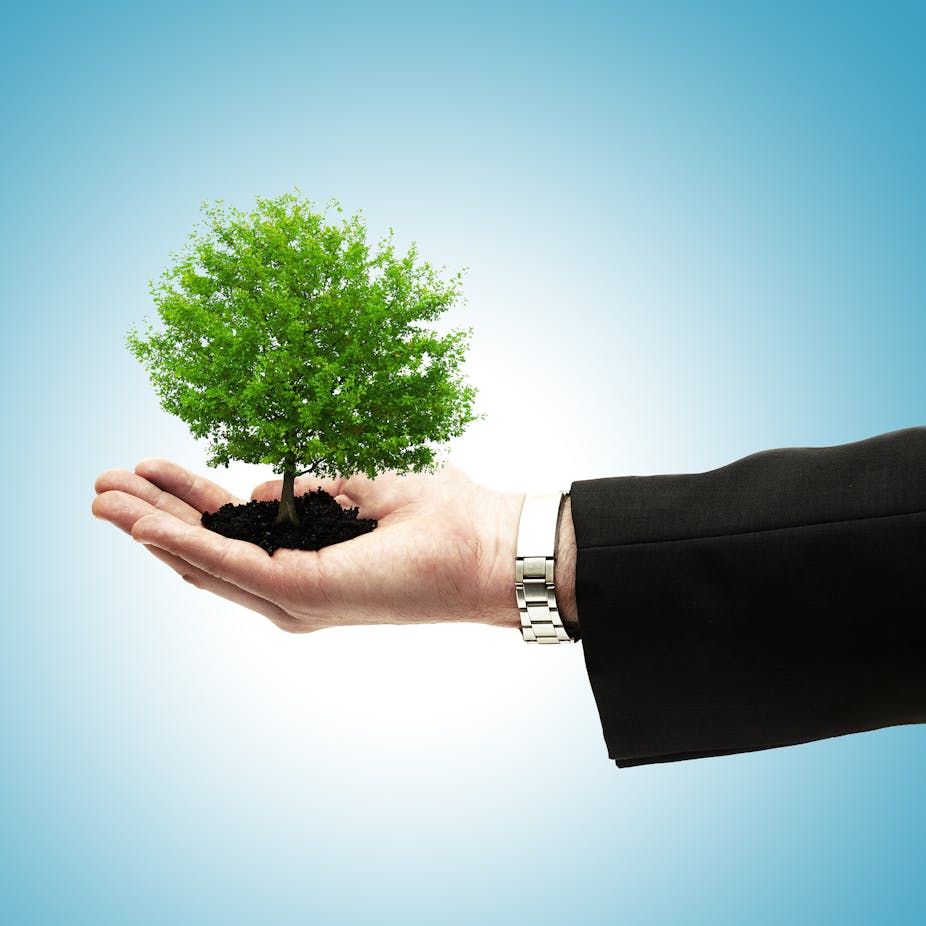Australians are often presented with a choice – you can either have more jobs or you can look after the environment. At least, that’s what some of the political rhetoric would have you believe.
But what if you could have your cake and eat it too? What if you could grow the economy while improving the environment?
As the government changes some key environmental policy settings, particularly around climate change, we will need to focus on changing industries through the green training we give future workers.
What are green jobs?
In a report commissioned by United Nations Environment Programme, green jobs are those that include the skills and understanding to protect biodiversity, reduce energy, materials, water consumption, de-carbonize the economy and minimise waste.
But new green jobs and the greening of existing industries will require more than just technical skills, but a deeper understanding of sustainable practice.
As the former government put it students will need “the knowledge, values and attitudes needed in the workplace to develop and support sustainable social, economic and environmental outcomes in business, industry and the community”.
This will need to include sustainable approaches, innovation, whole-of-systems thinking, envisioning and collaborative problem solving.
Examples in practice
There are many examples of green skills in a whole range of vocational education and training areas.
On the more technical side there are courses in green plumbing, construction of energy efficient buildings, and renewable energy and low input gardening. But wider sustainability skills are increasingly embedded into business, tourism, hospitality and events courses too.
Students studying finance and accounting for example can explore concepts of corporate social responsibility and development of sustainable procurement policies.
Many painting courses also now teach students to dispose of paint waste, water and solvents in an environmentally sustainable manner. Any number of other professions are increasingly establishing ways to help students evaluate their impact on the environment (eg energy and water) and society (eg local communities).
Why do they matter?
But why do we need to embed these kinds of skills in education and training?
The reality is the market for green products is growing rapidly. In the future every organisation will need workers with green skills. If we don’t explicitly train people now, then we may end up without enough workers – a kind of green skills gap.
We also know that when there are more of the same available products and services on the market, the cost falls because of greater competition. The more trained green plumbers there are for example, the less expensive it becomes to have efficient plumbing installed. It gradually becomes the norm as customers have more options and green plumbers are easier to find.
The overall benefit to the economy to green skilling our workers is significant. A report released in late 2008 by the Australian Council of Trade Unions and the Australian Conservation Foundation Australia, The Green Gold Rush, indicates that Australia could become a world leader in creating green industries, generating up to a million green collar jobs by 2030 and multi-billion dollar export opportunities in green technology.
There is also clear evidence that sustainable business approaches can generate significant economic benefits for a business. The Dow Jones Sustainability Index for example regularly sees sustainable businesses with better share market outcomes.
We also know from research that it is possible to combine economic growth with an improved environmental footprint over time.
Making a difference
Australia is a world leader in the area of greening skills. In 2000, the Australian Government established its first Environmental Education for a Sustainable Future: National Action Plan – a world first. In 2009, the states and federal government also signed a Green Skills Agreement to enable vocational education providers to expand their greener course offerings.
It is clear from research that this agreement in particular has had an impact. A longitudinal survey found a significant increase in training for skills for sustainability in TAFE with respondents in 2008 indicating only 39% receiving information on sustainability through TAFE whereas by 2011 this had increased to 77%.
In addition, there was a 57% annual increase in the number of learners enrolled in one or more courses relating to sustainability in the 2010-2011 period (from 83,000 in 2009 to 130,000 in 2010). There was also a significant growth in green skills enrolments in electro-communications, service industries, manufacturing, and innovation and business Skills.
The Allen Consulting Group, commissioned by the Federal Government to evaluate the success of the Green Skills Agreement and its impact on the training sector earlier this year, has completed its report. The findings are eagerly awaited.
We look forward to the day we never need to use words such as “green skills” or “green jobs”. Why? Because it will be way we just do business, integrated into everything we do.
This piece is co-authored with Director of the International Green Skills Network, TAFE Directors Australia, Linda Condon.

